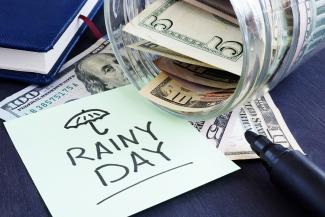
Building Your Emergency Fund
With the recent government shutdown and the personal stories of Americans not being able to pay their mortgage or buy food for their families, I feel compelled to talk about the importance of creating your emergency fund. We all have had one of those months where the water heater stops heating, the dishwasher stops washing or your family ends up on a first-name basis with the nurse at urgent care. Bad things happen to all of us. The important thing is to have a financial life preserver in the form of an emergency cash fund at the ready.
When starting an emergency fund, you’ll want to set a target amount, but how much is enough? Unfortunately, there is no “one-size-fits-all” answer and depends on your financial situation and lifestyle. For example, if you own a home or provide for several children, you may be more likely to face financial emergencies. If the crisis involves the loss of income, you may need to depend on your emergency fund for an extended period of time. As a rule of thumb, I recommend at least 3 to 6 months of expenses.
If saving several months of income seems like an unreasonable goal, don’t despair. Start with a more modest target, such as saving $1,000. Build your savings at regular intervals, a bit at a time. It may help if you treat the transaction like a bill you pay each month. Consider setting up an automatic monthly transfer to make self-discipline a matter of course. Also, consider paying off any credit card debt before you begin saving.
Once you see your savings accumulate, don’t be tempted to use the account for anything other than an emergency. Budget and prepare separately for bigger expenses you know are coming. An emergency fund should be easily accessible, but keep it separate from your checking account. Many people choose a traditional bank savings account.
The only sure thing about unexpected expenses is that sooner or later they will show up. Having an emergency fund may help alleviate the stress and worry associated with a financial crisis.
Information in this material is for general information only and not intended as investment, tax or legal advice. Please consult the appropriate professionals for specific information regarding your individual situation prior to making any financial decision.
Email me your questions at financial.feedom@lpl.com or call 541-574-6464. You can also post your questions on our Facebook page.

